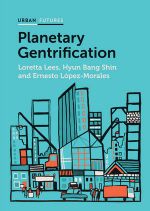Planetary Gentrification

Planetary Gentrification, by Loretta Lees, Hyun Bang Shin and Ernesto López-Morales, explores two principal questions: Does the concept of gentrification have a global application, and does generalized gentrification really exist? Through a critical political economy lens, the authors bring together their regional and linguistic expertise on comparative urbanism of planetary gentrification that goes beyond the usual Euro-American suspects. By doing so, they hope to give gentrification studies new vigour and new analytic rigour, as well as to realign the axis of comparison (pages 206–207).
The authors’ own regional expertise (Europe and North America – Lees; Southeast and East Asia – Shin; and Latin America – López-Morales) adds to hypotheses of local authors and data collected from 2014 workshops on global gentrification and a survey of non-Western case studies of gentrification. Together, they unlearn existing conceptualizations/theories, ideologies and practices/policies around gentrification, and question how experience from around the globe may enrich gentrification theory and concepts (pages 5 and 8). Overall, they argue that the study of gentrification can help us to understand the complexity of urbanization processes (pages 4 and 205).
Starting with Ruth Glass (1964), who coined the term “gentrification” and pointed towards planetary gentrification, this book responds to a call for “a reloaded urban studies” (page 8). It also aims to breach the gap between development studies and urban studies, and to treat gentrification more as an urban process and less as an urban form (page 13). It understands gentrification as “the appropriation of land to serve the interests of the wealthy” and sees urbanization around the world as producing multiple centralities rather than the typical singular centrality (or inner city) (pages 218 and 11).
Lees, Shin and López-Morales build on recent postcolonial critiques of urban studies from different parts of the world to develop a more planetary view of gentrification (page 202). They argue that the state is under-conceptualized in gentrification studies and illustrate how municipal governments have an increased focus on transforming urban space at the cost of their populations (page 15). Throughout this book, they show how spatial restructuring processes provide breeding grounds for gentrification as capitalism renders part of the population disposable and thus leads to displacements of people (page 17).
In conclusion, they agree that there is a global application of gentrification and it can be generalized, but only if the concept is kept “general enough to facilitate universality while providing the flexibility to accommodate changing conditions and local circumstances” (page 203). Furthermore, they conclude that the differences they identify are not radical enough to warrant dilution or dismissal of the term.
Book note prepared by Hannah Keren Lee
Search the Book notes database
Our Book notes database contains details and summaries of all the publications included in Book notes since 1993 - with details on how to obtain/download.
Use the search form above, or visit the Book notes landing page for more options and latest content.
For a searchable database for papers in Environment and Urbanization, go to http://eau.sagepub.com/

